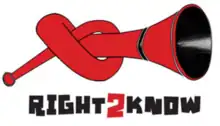Right2Know
The Right2Know Campaign is a South African non-profit advocacy organisation established in 2010 to reduce state secrecy in the drafting of laws, increase access to information, and protect freedom of expression especially on the internet. As part of this, the campaign monitors and challenges potential legislation that it believes would infringe on personal liberties and transparent government. It is the first such organisation of its kind in post-Apartheid South Africa.[1]
 | |
| Founded | August 2010[1] |
|---|---|
| Type | Nonprofit organization |
| Purpose | Digital rights, activism, and access to information |
| Location |
|
| Coordinates | 33°55′48″S 18°27′27″E |
| Expenses | R3.22 million[2] (2014) roughly equivalent to US$227,000 |
| Website | www |
Activism
Notable events that the Right2Know Campaign has been directly involved in include organising protests for investigations into corporate and government corruption,[3] protect whistle-blowers,[4] and campaigns to increase government accountability.
A significant success of the campaign was the calling for[5] and eventual publication by government[6] of South Africa's list of national key points, thereby informing the public of which government locations in South Africa were forbidden to photograph. It was claimed by government that the controversial security upgrades to President Jacob Zuma's homestead, Nkandla, was justified as it was a listed national key point.[5]
In October 2015, South African State Security officials issued a statement to the South African parliament accusing the Right2Know Campaign of being an agent for foreign governments and the US government in particular.[7] The Right2Know campaign denied the accusations whilst stating that it openly publishes all of its financials to the public which indicate no such link and condemned the accusation as an example of the growing securitisation of the South African parliament. It went on to point out that the South African security establishment have previously used such accusations in the past to try and explain public discontent by blaming a range of non-government organisations as foreign agents.[8]
References
- "Right2Know website". Right2Know. Retrieved 7 November 2015.
- "Audited Financial Statements" (PDF). Right2Know. 31 December 2014. Retrieved 7 November 2015.
- "South Africa: R2K Protest for Investigation Into MTN and Ramaphosa Corruption Allegations". All Africa. 14 October 2015. Retrieved 7 November 2015.
- Yadhana Jadoo (9 September 2013). "ANC 'must give info on media'". The Citizen. Retrieved 7 November 2015.
- "Right2Know wants National Key Points revealed". Times Live. 23 November 2014. Retrieved 7 November 2015.
- Catherine Kennedy and Murray Hunter (23 January 2015). "R2K & SAHA welcome Police Ministry's decision to release the National Key Points". Right2Know & South African History Archive. Retrieved 7 November 2015.
- "Fighting for the Right to Know in South Africa". luminategroup.com. Retrieved 2023-08-22.
- Right2Know Campaign (18 October 2015). "South Africa: R2K Response to the Securocrats - We Aren't Hiding!". All Africa. Retrieved 7 November 2015.